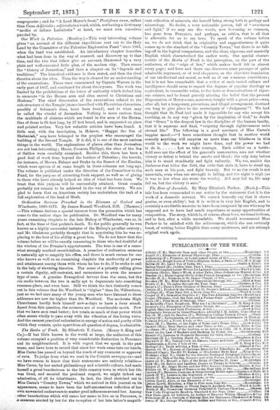The Realm of Truth. By Elizabeth T. Came. (Henry S.
King and Co.)—If but little known to the world at large, the authoress of this volume occupied a position of very considerable distinction in Penzance and its neighbourhood. It is with regret that we speak in the past tense, and have here to record that since her work came into our'hands, Miss Came has passed on beyond the reach of any comment or approval of ours. To judge from what we read in the Cornish newspapers—and we have reason to know that their statements are entirely reliable— Miss Came, by her united philanthropy and scientific culture, had made herself a great benefactress to the little country town in which her life was lived, and secured the profound respect, we might indeed say admiration, of all its inhabitants. In fact, the ideal sketched out in Miss Carne's "Country Towns," which we noticed in this journal on its appearance, seems to have been the half-unconscious reflection of her own unwearied endeavours to scatter good influences around her. Among 1 other benefactions which will cause her name to live on in Penzance, is a museum erected by her for the reception of her late father's magnifi- cent collection of minerals, she herself being strong both in geology and mineralogy. No doubt, a very noticeable person, full of " sweetness and light," if we may use the words, now becoming so common, has gone from Penzance, and perhaps, as critics, that is all that is allowable for us to say here. To speak of tho volume before us, wo do not think that in originality and suggestiveness it quite comes up to the standard of the "Country Towns," but there is no fall- ing-off in the logical compactness, and the clear, vigorous, and masterly English which characterised the earlier work. One special charac- teristic of tho Realm of Truth is the perception, on the part of the authoress, of the "reign of law," which makes itself felt in almost every page ; and hero and there one discovers some passages of quite admirable argument, or of real eloquence, on the objective foundation of our intellectual and moral, as well as of our sensuous convictions ; but it is not less remarkable that a writer of such varied culture and intelligence should seem to regard the dogmas of popular theology as equivalent, in reasonable value, to the facts or demonstrations of rigor- ous science, and be found gravely uttering the belief that the present Dispensation of Mercy—one, moreover, bought with a great price—was, after all, but a temporary, precarious, and illegal arrangement, destined ere long to give place to the sovereignty of -Judgment"! We had thought that St. Paul had made it impossible for any who accept his teaching, as in any way "given by the inspiration of God," to doubt that " Grace " is the deepest law in the discipline of the human family, that it is supreme and final, " reigning through righteousness unto eternal life." The following is a good specimen of Miss Carne's happier mood :—" I have sometimes thought that in another world scarcely anything will surprise us more than our blindness in this world to the work we might have done, and the power we had to do it Lot ne take courage. Each soldier on a battle- field sees not the effect of his general's manoeuvres, sees not whether victory or defeat is behind the smoke and blood : the only duty before him is to stand steadfastly and fight valiantly. We, too, amidst the darkness that hides the field, the evils that stain it, have to stand up, each man at his post, and fight bravely. But to us the result is not uncertain, even when our strength is failing, and the night is nigh (as it was to her when she wrote the words). Aid may fail us, life may fail us, but the victory is sure."


































 Previous page
Previous page